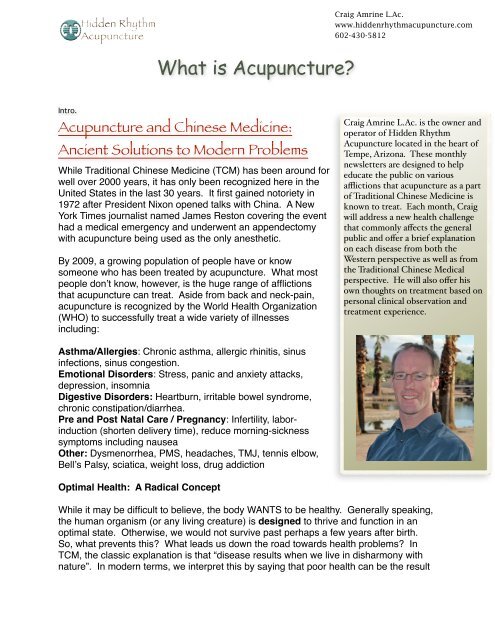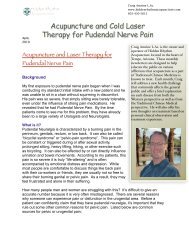Acupuncture and Chinese Medicine-Ancient Solutions to Modern ...
Acupuncture and Chinese Medicine-Ancient Solutions to Modern ...
Acupuncture and Chinese Medicine-Ancient Solutions to Modern ...
You also want an ePaper? Increase the reach of your titles
YUMPU automatically turns print PDFs into web optimized ePapers that Google loves.
Craig Amrine L.Ac.<br />
www.hiddenrhythmacupuncture.com<br />
602-430-5812<br />
What is <strong>Acupuncture</strong>?<br />
<br />
<strong>Acupuncture</strong> <strong>and</strong> <strong>Chinese</strong> <strong>Medicine</strong>:<br />
<strong>Ancient</strong> <strong>Solutions</strong> <strong>to</strong> <strong>Modern</strong> Problems<br />
While Traditional <strong>Chinese</strong> <strong>Medicine</strong> (TCM) has been around for<br />
well over 2000 years, it has only been recognized here in the<br />
United States in the last 30 years. It first gained no<strong>to</strong>riety in<br />
1972 after President Nixon opened talks with China. A New<br />
York Times journalist named James Res<strong>to</strong>n covering the event<br />
had a medical emergency <strong>and</strong> underwent an appendec<strong>to</strong>my<br />
with acupuncture being used as the only anesthetic.<br />
By 2009, a growing population of people have or know<br />
someone who has been treated by acupuncture. What most<br />
people donʼt know, however, is the huge range of afflictions<br />
that acupuncture can treat. Aside from back <strong>and</strong> neck-pain,<br />
acupuncture is recognized by the World Health Organization<br />
(WHO) <strong>to</strong> successfully treat a wide variety of illnesses<br />
including:<br />
Craig Amrine L.Ac. is the owner <strong>and</strong><br />
opera<strong>to</strong>r of Hidden Rhythm<br />
<strong>Acupuncture</strong> located in the heart of<br />
Tempe, Arizona. These monthly<br />
newsletters are designed <strong>to</strong> help<br />
educate the public on various<br />
afflictions that acupuncture as a part<br />
of Traditional <strong>Chinese</strong> <strong>Medicine</strong> is<br />
known <strong>to</strong> treat. Each month, Craig<br />
will address a new health challenge<br />
that commonly affects the general<br />
public <strong>and</strong> offer a brief explanation<br />
on each disease from both the<br />
Western perspective as well as from<br />
the Traditional <strong>Chinese</strong> Medical<br />
perspective. He will also offer his<br />
own thoughts on treatment based on<br />
personal clinical observation <strong>and</strong><br />
treatment experience.<br />
Asthma/Allergies: Chronic asthma, allergic rhinitis, sinus<br />
infections, sinus congestion.<br />
Emotional Disorders: Stress, panic <strong>and</strong> anxiety attacks,<br />
depression, insomnia<br />
Digestive Disorders: Heartburn, irritable bowel syndrome,<br />
chronic constipation/diarrhea.<br />
Pre <strong>and</strong> Post Natal Care / Pregnancy: Infertility, laborinduction<br />
(shorten delivery time), reduce morning-sickness<br />
symp<strong>to</strong>ms including nausea<br />
Other: Dysmenorrhea, PMS, headaches, TMJ, tennis elbow,<br />
Bellʼs Palsy, sciatica, weight loss, drug addiction<br />
Optimal Health: A Radical Concept<br />
While it may be difficult <strong>to</strong> believe, the body WANTS <strong>to</strong> be healthy. Generally speaking,<br />
the human organism (or any living creature) is designed <strong>to</strong> thrive <strong>and</strong> function in an<br />
optimal state. Otherwise, we would not survive past perhaps a few years after birth.<br />
So, what prevents this? What leads us down the road <strong>to</strong>wards health problems? In<br />
TCM, the classic explanation is that “disease results when we live in disharmony with<br />
nature”. In modern terms, we interpret this by saying that poor health can be the result
of excessive stress, poor diet, environmental <strong>to</strong>xins, lack of sleep, sedentary lifestyle,<br />
<strong>and</strong> over-work. All of these fac<strong>to</strong>rs can lead <strong>to</strong> the imbalance preventing the body from<br />
thriving in its optimal state. Acupuncturists take this concept a step further by using<br />
needles <strong>to</strong> help res<strong>to</strong>re this balance. We donʼt “cure” the patient. We simply nudge the<br />
body <strong>to</strong>wards balance <strong>to</strong> allow it <strong>to</strong> heal itself.<br />
How does it work?<br />
<strong>Acupuncture</strong> relies on the theory that a “vital-force” or Qi flows through the body in a<br />
series of pathways called meridians. In Traditional <strong>Chinese</strong> <strong>Medicine</strong> (TCM), there are<br />
12 primary <strong>and</strong> 8 secondary meridians. Disease occurs when the flow of Qi is blocked<br />
or deficient in one or more of these channels. <strong>Acupuncture</strong> needles are inserted in<br />
certain points along these channels <strong>to</strong> rectify the imbalance in this flow. A good<br />
acupuncturist will be able <strong>to</strong> interpret the symp<strong>to</strong>ms, recognize the type of imbalance,<br />
<strong>and</strong> choose a combination from over 365 acupuncture points in the body <strong>to</strong> res<strong>to</strong>re this<br />
balance.<br />
“BUT I HATE NEEDLES!!”<br />
One of the greatest challenges that I have <strong>to</strong> get patients in<strong>to</strong> my clinic is their deeprooted<br />
fear <strong>and</strong> distrust of needles; usually the result of some traumatic childhood<br />
trauma at the doc<strong>to</strong>rʼs office.<br />
While acupuncture needles vary in size, most are far smaller than the average<br />
hypodermic needles. During many treatments, patients donʼt even realize that the<br />
needles have been inserted. At most, the patients feel a mild tinging around the area of<br />
needle insertion <strong>and</strong> are genuinely surprised how painless the treatment is. Even<br />
children no longer dread coming <strong>to</strong> the clinic once their initial fears are allayed.<br />
Technology vs. Tradition<br />
In a time of as<strong>to</strong>unding technological achievements <strong>and</strong> advancements in science, how<br />
is it that such a such a simple <strong>to</strong>ol can be used <strong>to</strong> successfully treat such a wide variety<br />
of health problems? Surely with the millions of dollars spent on the research <strong>and</strong><br />
marketing of new drugs each year, acupuncture should be discarded in favor of modern<br />
medicine. Shouldnʼt it?<br />
While there is a proper time <strong>and</strong> place for modern pharmaceuticals, many of the drugs<br />
used <strong>to</strong> treat common health problems rely on relieving symp<strong>to</strong>ms rather than improving<br />
health. In order <strong>to</strong> achieve this, some physiological response must be compromised,<br />
often leading <strong>to</strong> several undesirable <strong>and</strong> possibly dangerous side-effects.<br />
Letʼs examine two health problems heavily marketed by drug companies on TV:<br />
Asthma/Allergies <strong>and</strong> Insomnia. Both of these problems are extremely common <strong>and</strong><br />
coincidentally are very successfully treated by acupuncture.<br />
Shown below are the side-effects listed (from their website) for a common allergy<br />
medication <strong>to</strong> treat allergic rhinitis:
“ - occurring at a frequency greater than or equal <strong>to</strong> 1% <strong>and</strong> at an incidence greater than<br />
placebo, regardless of causality assessment, were sinusitis, upper respira<strong>to</strong>ry infection,<br />
sinus headache, cough, epistaxis, headache, otitis media, pharyngitis, <strong>and</strong> increased<br />
ALT. “ - (www.singulair.com)<br />
The side-effects listed for a common sleep-aid as shown on the popular website:<br />
www.rxlist.com. These side-effects were listed in a clinical trial <strong>and</strong> shown <strong>to</strong> occur in<br />
greater frequency than a placebo:<br />
“ Headache, depression, dizziness, hallucinations, libido decreased, nervousness,<br />
somnolence, respira<strong>to</strong>ry system infection, skin rash, unpleasant taste, gynecomastia,<br />
dysmenorrhea*”<br />
In contrast, the long-term side-effects of acupuncture, regardless of the details of<br />
treatment, may include a mild euphoria, relaxation, improved sleep, <strong>and</strong> an enhanced<br />
immune system.<br />
So, which approach would you choose?<br />
There is hope!<br />
Fortunately, many health insurance companies have recently discovered that<br />
acupuncture is actually less expensive than surgeries <strong>and</strong> pharmaceutical drugs for<br />
many of <strong>to</strong>dayʼs modern health problems. More importantly, they recognize the vast<br />
amount of data proving acupuncture as a very real <strong>and</strong> powerful healing modality. As a<br />
result, several health insurance companies will now reimburse patients for acupuncture<br />
treatments.<br />
<strong>Acupuncture</strong> is growing. Even medical doc<strong>to</strong>rs <strong>and</strong> chiroprac<strong>to</strong>rs have tried <strong>to</strong> exploit<br />
the popularity by establishing fast-track courses allowing them <strong>to</strong> use acupuncture<br />
needles.<br />
So before you reach in<strong>to</strong> the medicine cabinet <strong>to</strong> deal with chronic allergies, or request<br />
another cortisone shot for your knee, discuss the problem with your local acupuncturist.<br />
It may be the better (<strong>and</strong> safer) choice.





